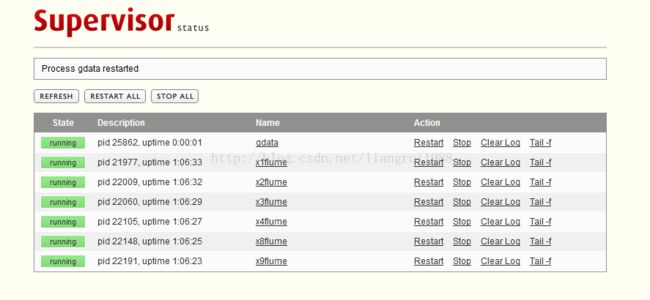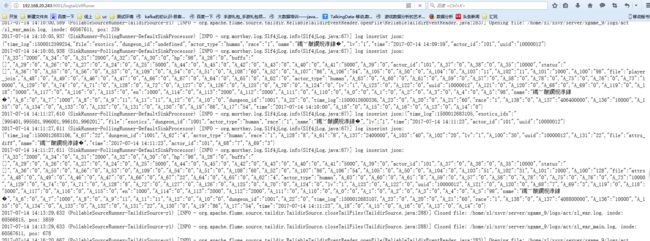supervisor管理后台进程之flume
之前后台进程都是用nohup *.sh 来跑的,不方便维护和监控,
每台服务器启一个flume收集日志的后台进程。
可以进行监控,和通过页面,启动,关闭服务,查看日志
1.2. 介绍
Supervisor是一个进程控制系统. 它是一个C/S系统(注意: 其提供WEB接口给用户查询和控制), 它允许用户去监控和控制在类UNIX系统的进程. 它的目标与launchd, daemontools和runit有些相似, 但是与它们不一样的是, 它不是作为init(进程号pid是1)运行. 它是被用来控制进程, 并且它在启动的时候和一般程序并无二致.
那么通俗点,它的作用是什么?你的Nginx,Tomcat,memcache,Redis...会崩么,不会?好吧,那你自己写的服务器监测脚本呢?好吧,不要再纠结了,交给Supervisor吧,它会帮你维护这些,即使它们不小心崩了,Supervisor会帮你看住它们,维护它们。
安装(Centos):
- # yum install python-setuptools
- # easy_install supervisor
- 如果easy_install不好使就从官方下载:
- 然后通过python安装:
- # tar zxf supervisor-3.1.3.tar.gz
- # cd supervisor
- # python setup.py install
成功安装后可以登陆python控制台输入import supervisor 查看是否能成功加载。
生成配置文件(supervisord.conf):
echo_supervisord_conf > /etc/supervisord.conf
配置文件:
; Sample supervisor config file.
;
; For more information on the config file, please see:
; http://supervisord.org/configuration.html
;
; Notes:
; - Shell expansion ("~" or "$HOME") is not supported. Environment
; variables can be expanded using this syntax: "%(ENV_HOME)s".
; - Quotes around values are not supported, except in the case of
; the environment= options as shown below.
; - Comments must have a leading space: "a=b ;comment" not "a=b;comment".
; - Command will be truncated if it looks like a config file comment, e.g.
; "command=bash -c 'foo ; bar'" will truncate to "command=bash -c 'foo ".
[unix_http_server]
file=/tmp/supervisor.sock ; the path to the socket file
;chmod=0700 ; socket file mode (default 0700)
;chown=nobody:nogroup ; socket file uid:gid owner
;username=user ; default is no username (open server)
;password=123 ; default is no password (open server)
[inet_http_server] ; inet (TCP) server disabled by default
port=*:9001
;username=admin ; default is no username (open server)
;password=admin ; default is no password (open server)
[supervisord]
logfile=/tmp/supervisord.log ; main log file; default $CWD/supervisord.log
logfile_maxbytes=50MB ; max main logfile bytes b4 rotation; default 50MB
logfile_backups=10 ; # of main logfile backups; 0 means none, default 10
loglevel=info ; log level; default info; others: debug,warn,trace
pidfile=/tmp/supervisord.pid ; supervisord pidfile; default supervisord.pid
nodaemon=false ; start in foreground if true; default false
minfds=1024 ; min. avail startup file descriptors; default 1024
minprocs=200 ; min. avail process descriptors;default 200
;umask=022 ; process file creation umask; default 022
;user=chrism ; default is current user, required if root
;identifier=supervisor ; supervisord identifier, default is 'supervisor'
;directory=/tmp ; default is not to cd during start
;nocleanup=true ; don't clean up tempfiles at start; default false
;childlogdir=/tmp ; 'AUTO' child log dir, default $TEMP
;environment=KEY="value" ; key value pairs to add to environment
;strip_ansi=false ; strip ansi escape codes in logs; def. false
; The rpcinterface:supervisor section must remain in the config file for
; RPC (supervisorctl/web interface) to work. Additional interfaces may be
; added by defining them in separate [rpcinterface:x] sections.
[rpcinterface:supervisor]
supervisor.rpcinterface_factory = supervisor.rpcinterface:make_main_rpcinterface
; The supervisorctl section configures how supervisorctl will connect to
; supervisord. configure it match the settings in either the unix_http_server
; or inet_http_server section.
[supervisorctl]
serverurl=unix:///tmp/supervisor.sock ; use a unix:// URL for a unix socket
;serverurl=http://127.0.0.1:9001 ; use an http:// url to specify an inet socket
;username=chris ; should be same as in [*_http_server] if set
;password=123 ; should be same as in [*_http_server] if set
;prompt=mysupervisor ; cmd line prompt (default "supervisor")
;history_file=~/.sc_history ; use readline history if available
; The sample program section below shows all possible program subsection values.
; Create one or more 'real' program: sections to be able to control them under
; supervisor.
;[program:theprogramname]
;command=/bin/cat ; the program (relative uses PATH, can take args)
;process_name=%(program_name)s ; process_name expr (default %(program_name)s)
;numprocs=1 ; number of processes copies to start (def 1)
;directory=/tmp ; directory to cwd to before exec (def no cwd)
;umask=022 ; umask for process (default None)
;priority=999 ; the relative start priority (default 999)
;autostart=true ; start at supervisord start (default: true)
;startsecs=1 ; # of secs prog must stay up to be running (def. 1)
;startretries=3 ; max # of serial start failures when starting (default 3)
;autorestart=unexpected ; when to restart if exited after running (def: unexpected)
;exitcodes=0,2 ; 'expected' exit codes used with autorestart (default 0,2)
;stopsignal=QUIT ; signal used to kill process (default TERM)
;stopwaitsecs=10 ; max num secs to wait b4 SIGKILL (default 10)
;stopasgroup=false ; send stop signal to the UNIX process group (default false)
;killasgroup=false ; SIGKILL the UNIX process group (def false)
;user=chrism ; setuid to this UNIX account to run the program
;redirect_stderr=true ; redirect proc stderr to stdout (default false)
;stdout_logfile=/a/path ; stdout log path, NONE for none; default AUTO
;stdout_logfile_maxbytes=1MB ; max # logfile bytes b4 rotation (default 50MB)
;stdout_logfile_backups=10 ; # of stdout logfile backups (0 means none, default 10)
;stdout_capture_maxbytes=1MB ; number of bytes in 'capturemode' (default 0)
;stdout_events_enabled=false ; emit events on stdout writes (default false)
;stderr_logfile=/a/path ; stderr log path, NONE for none; default AUTO
;stderr_logfile_maxbytes=1MB ; max # logfile bytes b4 rotation (default 50MB)
;stderr_logfile_backups=10 ; # of stderr logfile backups (0 means none, default 10)
;stderr_capture_maxbytes=1MB ; number of bytes in 'capturemode' (default 0)
;stderr_events_enabled=false ; emit events on stderr writes (default false)
;environment=A="1",B="2" ; process environment additions (def no adds)
;serverurl=AUTO ; override serverurl computation (childutils)
; The sample eventlistener section below shows all possible eventlistener
; subsection values. Create one or more 'real' eventlistener: sections to be
; able to handle event notifications sent by supervisord.
;[eventlistener:theeventlistenername]
;command=/bin/eventlistener ; the program (relative uses PATH, can take args)
;process_name=%(program_name)s ; process_name expr (default %(program_name)s)
;numprocs=1 ; number of processes copies to start (def 1)
;events=EVENT ; event notif. types to subscribe to (req'd)
;buffer_size=10 ; event buffer queue size (default 10)
;directory=/tmp ; directory to cwd to before exec (def no cwd)
;umask=022 ; umask for process (default None)
;priority=-1 ; the relative start priority (default -1)
;autostart=true ; start at supervisord start (default: true)
;startsecs=1 ; # of secs prog must stay up to be running (def. 1)
;startretries=3 ; max # of serial start failures when starting (default 3)
;autorestart=unexpected ; autorestart if exited after running (def: unexpected)
;exitcodes=0,2 ; 'expected' exit codes used with autorestart (default 0,2)
;stopsignal=QUIT ; signal used to kill process (default TERM)
;stopwaitsecs=10 ; max num secs to wait b4 SIGKILL (default 10)
;stopasgroup=false ; send stop signal to the UNIX process group (default false)
;killasgroup=false ; SIGKILL the UNIX process group (def false)
;user=chrism ; setuid to this UNIX account to run the program
;redirect_stderr=false ; redirect_stderr=true is not allowed for eventlisteners
;stdout_logfile=/a/path ; stdout log path, NONE for none; default AUTO
;stdout_logfile_maxbytes=1MB ; max # logfile bytes b4 rotation (default 50MB)
;stdout_logfile_backups=10 ; # of stdout logfile backups (0 means none, default 10)
;stdout_events_enabled=false ; emit events on stdout writes (default false)
;stderr_logfile=/a/path ; stderr log path, NONE for none; default AUTO
;stderr_logfile_maxbytes=1MB ; max # logfile bytes b4 rotation (default 50MB)
;stderr_logfile_backups=10 ; # of stderr logfile backups (0 means none, default 10)
;stderr_events_enabled=false ; emit events on stderr writes (default false)
;environment=A="1",B="2" ; process environment additions
;serverurl=AUTO ; override serverurl computation (childutils)
; The sample group section below shows all possible group values. Create one
; or more 'real' group: sections to create "heterogeneous" process groups.
;[group:thegroupname]
;programs=progname1,progname2 ; each refers to 'x' in [program:x] definitions
;priority=999 ; the relative start priority (default 999)
[program:gdata]
command=/home/web_admin/pro/server/gdata/run.sh
directory=/home/web_admin/pro/server/gdata
[program:x1flume]
command=/home/web_admin/opt/v2_flume-apache170/bin/flume-ng agent --conf /home/web_admin/opt/v2_flume-apache170/conf --conf-file /home/web_admin/opt/v2_flume-apache170/conf/x1_dir_to_db_flume.conf --name a1 -Dflume.root.logger=INFO,console
directory=/home/web_admin/opt/v2_flume-apache170/starDir
autostart = false
autorestart = false
redirect_stderr=true
stdout_logfile=/home/web_admin/opt/v2_flume-apache170/starDir/log/x1_dir.log
stdout_logfile_maxbytes=200MB
stdout_logfile_backups=10
stderr_logfile=/home/web_admin/opt/v2_flume-apache170/starDir/log/x1_dir_err.log
stderr_logfile_maxbytes=100MB
[program:x2flume]
command=/home/web_admin/opt/v2_flume-apache170/bin/flume-ng agent --conf /home/web_admin/opt/v2_flume-apache170/conf --conf-file /home/web_admin/opt/v2_flume-apache170/conf/x2_dir_to_db_flume.conf --name a1 -Dflume.root.logger=INFO,console
directory=/home/web_admin/opt/v2_flume-apache170/starDir
autostart = false
autorestart = false
redirect_stderr=true
stdout_logfile=/home/web_admin/opt/v2_flume-apache170/starDir/log/x2_dir.log
stdout_logfile_maxbytes=100MB
stdout_logfile_backups=10
[program:x3flume]
command=/home/web_admin/opt/v2_flume-apache170/bin/flume-ng agent --conf /home/web_admin/opt/v2_flume-apache170/conf --conf-file /home/web_admin/opt/v2_flume-apache170/conf/x3_dir_to_db_flume.conf --name a1 -Dflume.root.logger=INFO,console
directory=/home/web_admin/opt/v2_flume-apache170/starDir
autostart = false
autorestart = false
redirect_stderr=true
stdout_logfile=/home/web_admin/opt/v2_flume-apache170/starDir/log/x3_dir.log
stdout_logfile_maxbytes=100MB
stdout_logfile_backups=10
[program:x4flume]
command=/home/web_admin/opt/v2_flume-apache170/bin/flume-ng agent --conf /home/web_admin/opt/v2_flume-apache170/conf --conf-file /home/web_admin/opt/v2_flume-apache170/conf/x4_dir_to_db_flume.conf --name a1 -Dflume.root.logger=INFO,console
directory=/home/web_admin/opt/v2_flume-apache170/starDir
autostart = false
autorestart = false
redirect_stderr=true
stdout_logfile=/home/web_admin/opt/v2_flume-apache170/starDir/log/x4_dir.log
stdout_logfile_maxbytes=100MB
stdout_logfile_backups=10
[program:x8flume]
command=/home/web_admin/opt/v2_flume-apache170/bin/flume-ng agent --conf /home/web_admin/opt/v2_flume-apache170/conf --conf-file /home/web_admin/opt/v2_flume-apache170/conf/x8_dir_to_db_flume.conf --name a1 -Dflume.root.logger=INFO,console
directory=/home/web_admin/opt/v2_flume-apache170/starDir
autostart = false
autorestart = false
redirect_stderr=true
stdout_logfile=/home/web_admin/opt/v2_flume-apache170/starDir/log/x8_dir.log
stdout_logfile_maxbytes=100MB
stdout_logfile_backups=10
[program:x9flume]
command=/home/web_admin/opt/v2_flume-apache170/bin/flume-ng agent --conf /home/web_admin/opt/v2_flume-apache170/conf --conf-file /home/web_admin/opt/v2_flume-apache170/conf/x9_dir_to_db_flume.conf --name a1 -Dflume.root.logger=INFO,console
directory=/home/web_admin/opt/v2_flume-apache170/starDir
autostart = false
autorestart = false
redirect_stderr=true
stdout_logfile=/home/web_admin/opt/v2_flume-apache170/starDir/log/x9_dir.log
stdout_logfile_maxbytes=100MB
stdout_logfile_backups=10
; The [include] section can just contain the "files" setting. This
; setting can list multiple files (separated by whitespace or
; newlines). It can also contain wildcards. The filenames are
; interpreted as relative to this file. Included files *cannot*
; include files themselves.
;[include]
;files = relative/directory/*.ini
主要参数说明:
该配置块包含一个或者多个program段,program来表明supervisord要控制哪些程序。该配置块的头部是有固定格式的,一个关键字program,后面跟着一个冒号,接下来才是程序名。例如:[program:foo],foo就是程序名,在使用supervisorctl来操作程序的时候,就是以foo来标明的。
command:启动程序使用的命令,可以是绝对路径或者相对路径
process_name:一个python字符串表达式,用来表示supervisor进程启动的这个的名称,默认值是%(program_name)s
numprocs:Supervisor启动这个程序的多个实例,如果numprocs>1,则process_name的表达式必须包含%(process_num)s,默认是1
numprocs_start:一个int偏移值,当启动实例的时候用来计算numprocs的值
priority:权重,可以控制程序启动和关闭时的顺序,权重越低:越早启动,越晚关闭。默认值是999
autostart:如果设置为true,当supervisord启动的时候,进程会自动重启。
autorestart:值可以是false、true、unexpected。false:进程不会自动重启,unexpected:当程序退出时的退出码不是exitcodes中定义的时,进程会重启,true:进程会无条件重启当退出的时候。
startsecs:程序启动后等待多长时间后才认为程序启动成功
startretries:supervisord尝试启动一个程序时尝试的次数。默认是3
exitcodes:一个预期的退出返回码,默认是0,2。
stopsignal:当收到stop请求的时候,发送信号给程序,默认是TERM信号,也可以是 HUP, INT, QUIT, KILL, USR1, or USR2。
stopwaitsecs:在操作系统给supervisord发送SIGCHILD信号时等待的时间
stopasgroup:如果设置为true,则会使supervisor发送停止信号到整个进程组
killasgroup:如果设置为true,则在给程序发送SIGKILL信号的时候,会发送到整个进程组,它的子进程也会受到影响。
user:如果supervisord以root运行,则会使用这个设置用户启动子程序
redirect_stderr:如果设置为true,进程则会把标准错误输出到supervisord后台的标准输出文件描述符。
stdout_logfile:把进程的标准输出写入文件中,如果stdout_logfile没有设置或者设置为AUTO,则supervisor会自动选择一个文件位置。
stdout_logfile_maxbytes:标准输出log文件达到多少后自动进行轮转,单位是KB、MB、GB。如果设置为0则表示不限制日志文件大小
stdout_logfile_backups:标准输出日志轮转备份的数量,默认是10,如果设置为0,则不备份
stdout_capture_maxbytes:当进程处于stderr capture mode模式的时候,写入FIFO队列的最大bytes值,单位可以是KB、MB、GB
stdout_events_enabled:如果设置为true,当进程在写它的stderr到文件描述符的时候,PROCESS_LOG_STDERR事件会被触发
stderr_logfile:把进程的错误日志输出一个文件中,除非redirect_stderr参数被设置为true
stderr_logfile_maxbytes:错误log文件达到多少后自动进行轮转,单位是KB、MB、GB。如果设置为0则表示不限制日志文件大小
stderr_logfile_backups:错误日志轮转备份的数量,默认是10,如果设置为0,则不备份
stderr_capture_maxbytes:当进程处于stderr capture mode模式的时候,写入FIFO队列的最大bytes值,单位可以是KB、MB、GB
stderr_events_enabled:如果设置为true,当进程在写它的stderr到文件描述符的时候,PROCESS_LOG_STDERR事件会被触发
environment:一个k/v对的list列表
directory:supervisord在生成子进程的时候会切换到该目录
umask:设置进程的umask
serverurl:是否允许子进程和内部的HTTP服务通讯,如果设置为AUTO,supervisor会自动的构造一个url
eg:
启动
supervisord -c /home/web_admin/opt/supervisor/supervisord.conf //启动supervisor
打开控制台
supervisorctl
status stop start reload update shutdown 命令进行相关操作

